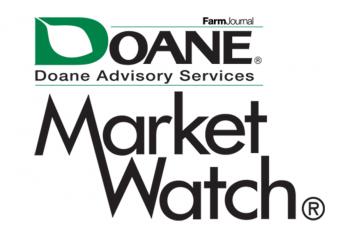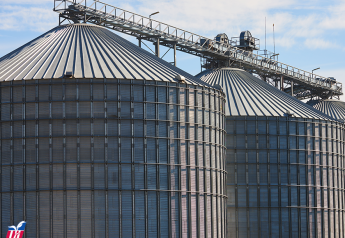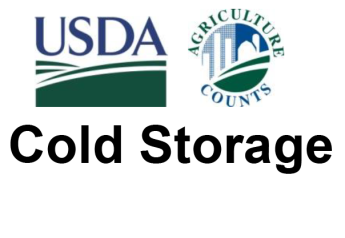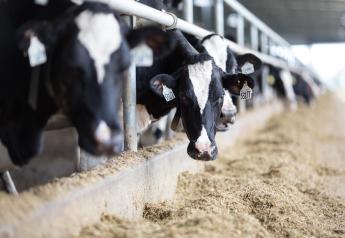Special Counsel: No Criminal Charges for Biden's Classified Document Mishandling

Senate takes step to advance aid to Ukraine, Israel, Taiwan | Farm income | USDA reports
|
Today’s Digital Newspaper |
An update of major news and market eventslsL=
— USDA reports: USDA raised corn and soybean carryover forecasts a bit above pre-report guesstimates, but what jumps out is that USDA remains woefully behind on Brazil crop estimates — above Conab and private industry projections. Some U.S. carryover details:
- Corn: USDA raised corn carryover 10 million bu. from last month to 2.172 billion bu., which would be the highest since 2018-19.
USDA 2023-24 price: $4.80, unchanged from January. - Soybeans: USDA increased ending stocks 35 million bu. from last month to 315 million bu., which would be the highest since 2019-20.USDA 2023-24 price: $12.65, down a dime from January.
- Wheat: USDA raised wheat carryover 10 million bu. from last month to 658 million bushels.
USDA 2023-24 price: $7.20, unchanged from last month. - Cotton: USDA cut its ending stocks forecast 100,000 bales from last month to 2.8 million bales, which would be the lowest since 2016-17.
USDA 2023-24 price: 77¢, down a penny from last month.
— Ag markets today:
- Corn: March corn fell 1 cent to $4.33 1/4, a contract-low close.
- Soybeans: March soybeans rose 4 cents on late-session buying to $11.93. March soymeal fell $4.10 to $347.10, nearer session lows. March bean oil surged 121 points to 47.97 cents, settling near session highs.
- Wheat: March SRW wheat fell 13 1/2 cents at $5.88 1/2. March HRW wheat closed down 17 1/4 cents at $6.01. Prices closed nearer their session lows and hit three-week lows today. March spring wheat fell 12 1/2 cents to $6.83 3/4.
- Cotton: March cotton futures surged 63 points before ending the day at 89.10 cents, marking the highest close since Sept. 28.
- Cattle: April live cattle rose $1.775 at $186.575 and nearer the session high. Prices hit a three-month high. March feeder cattle closed up $1.30 at $246.85 and nearer the session low. Prices hit a 3.5-month high early on.
- Hogs: A dip in hog and pork prices triggered another drop in hog futures Thursday, with expiring February futures sliding 7.5 cents to $73.30 and most-active April tumbling 75 cents to $80.35. Pork cutout values fell rather sharply (down $2.24 to $83.99) Wednesday.
— China cancels 2023/24 corn buys. USDA’s weekly Export Sales data for the week ended Feb 1 reported activity for 2023-24 that included net sales of 65,000 metric tons of wheat, net reductions (cancellations) of 68,000 metric tons of corn, net sales of 120,880 metric tons of sorghum, 307,780 metric tons of soybeans, and 118,751 running bales of upland cotton. For 2024, net sales of 3,409 metric tons of beef and 10,908 metric tons of pork were reported.
— The Democrat-led Senate advanced a $95 billion foreign aid bill today. The vote was 67-32, with 17 Republicans voting to advance the bill with additional votes pending. Along with Senate Minority Leader Mitch McConnell (R-Ky.), Republican Sens. Joni Ernst (Iowa), Roger Wicker (Miss.), Todd Young (Ind.), Susan Collins (Maine), Bill Cassidy (La.), Shelley Moore Capito (W.Va.), John Kennedy (La.), John Thune (S.D.), Dan Sullivan (Alaska), Mitt Romney (Utah), Mike Rounds (S.D.), Lisa Murkowski (Alaska), Jerry Moran (Kan.), Thom Tillis (N.C.), John Cornyn (Texas) and Chuck Grassley (Iowa) voted to advance the measure.
“Now that we are on the bill, we hope to reach agreement with our Republican colleagues on amendments,” Senate Majority Leader Chuck Schumer (D-N.Y.) said shortly after the vote. “We are going to keep working on this bill until the job is done.”
U.S. border security provisions were removed from the bill on Wednesday after a failed vote. The foreign aid package deals with Ukraine, Israel and Taiwan as well as humanitarian efforts in Gaza. House action on the matter is murky as House Speaker Mike Johnson (R-La.) has not indicated whether he will bring it to the floor for a vote.
— The federal budget deficit totaled $531 billion in the first four months of fiscal year 2024, CBO estimates — $71 billion more than the deficit recorded during the same period last fiscal year.
— House Energy and Commerce Committee Chair Cathy McMorris Rodgers (R-Wash.) will not seek re-election in November, ending a 19-year career in Congress. She served as House Republican Conference chair from 2013 to 2019, the highest-ranking woman in the House GOP for many years. In 2021, she became the top Republican on the House Energy and Commerce Committee. She is a very close ally to Speaker Mike Johnson (R-La.).
— Speaker Mike Johnson told Senate GOP leadership that he no longer plans to endorse Rep. Matt Rosendale in the Montana Senate race, according to Punchbowl News, citing multiple sources. The new came hours after the news outlet reported that he planned to back the hardline conservative, who is expected to launch his Senate campaign Friday. Johnson as expected got significant blowback. Senate GOP leadership is backing Tim Sheehy in the Montana contest against Sen. Jon Tester (D-Mont.) and have warned Rosendale's entry into the race could hurt their chances to flip the seat.
— China's export deflation signals global economic concern. China's slowing economy and excess capacity are leading to falling prices of its exports, causing concerns about deflation spreading to other economies, the Financial Times reports (link/paywall). Chinese export prices are declining at their fastest rate since the 2008 financial crisis, indicating a potential global impact. Investors predict that this deflationary pressure from China could prompt central banks, particularly in emerging markets, to cut interest rates. However, some economists argue that the influence of Chinese export prices on consumer prices in advanced economies might be limited, citing factors like the relatively small share of Chinese imports in total consumption. Nevertheless, there are concerns about the underestimation of U.S. imports from China and the potential for increased trade protectionism in response to cheaper Chinese exports. The article also highlights the impact on manufacturing sectors globally, with Chinese suppliers playing a critical role. It concludes by suggesting that while the U.S. and EU may face dilemmas regarding import reliance on China, other regions might simply opt for purchasing cheaper Chinese products if they meet quality standards.
— SCOTUS justices skeptical of disqualifying Trump from ballot. The U.S. Supreme Court heard arguments regarding a Colorado court's decision to remove former President Donald Trump from the state's Republican primary ballot due to his alleged participation in the Capitol attack of 2021. Justices seemed doubtful about the Colorado court's ruling, which invoked the 14th Amendment of the U.S. Constitution, Section 3, barring individuals who engaged in insurrection from holding public office. Trump's appeal of this decision has significant implications for the upcoming U.S. election, as he is considered a top contender for the Republican nomination to challenge President Joe Biden.
— Farm Bureau comments on USDA’s 2024 farm income forecasts. It says (link): “USDA’s most recent estimates for 2024 net farm income provide a very early forecast of the farm financial picture. For 2024, USDA anticipates a decrease in net farm income, moving from $155 billion in 2023 to $116 billion in 2024, a decrease of 25.5%. Much of the forecasted decline in 2024 net farm income is tied to lower crop and livestock cash receipts and continued increases in production costs. It is important to highlight the early nature of this forecast. For example, net farm income numbers for 2023 will not be finalized until August 2024 and have already been adjusted by over $18 billion since the first estimates were released in February 2022. USDA digests new information and data as it becomes available, shifting calculations from estimates to actual values. This means there is still much uncertainty in final 2024 net farm income. Numerous supply and demand conditions must unfold before economists can have confident expectations for the year’s farm income.”
Upshot: Farm Bureau concludes: “With an early expectation of significant revenue declines, though, it becomes all the more important for producers to have clarity on rules that impact their businesses’ ability to operate and for producers to have access to comprehensive risk management options. Farmers and ranchers will have a resounding voice, as they should, in the formulation of vital legislation such as the farm bill, which can either complicate or streamline their ability to contribute to a reliable and resilient U.S. food supply.”
— Sen. John Thune (R-S.D.) on farm bill: ‘No time to waste: Let’s get the farm bill done and done right.’ Thune, in a column on the new farm bill, said that “in South Dakota, agriculture is vital, and farmers and ranchers face significant risks. Congress regularly passes farm bills to support them. Although an extension of the 2018 farm bill was passed, it's essential to focus on updating and completing a new farm bill to provide farmers with improved tools. Crop insurance, commodity, and livestock programs are crucial for managing risk, but they need updates to meet current needs. Recent challenges, such as inflation and trade deficits, highlight the urgency of passing a comprehensive farm bill. Despite this, some Democrats seem focused on unrelated priorities, delaying the process. It's crucial to prioritize the needs of farmers and ranchers and pass a farm bill promptly.”
— Dicamba ruling imperils farmers' planting season; ASA urges EPA assistance. The American Soybean Association (ASA) and 26 state affiliates are urging the Environmental Protection Agency (EPA) to assist farmers following a dicamba ruling by a federal district court in Arizona. The court found that the EPA violated the law by not allowing public notice and comment before issuing 2020 dicamba registrations for use on dicamba-tolerant soybeans and cotton. This ruling affects over 50 million acres of dicamba-tolerant crops nationwide. ASA President Josh Gackle expressed concern over the impact on farmers as they approach the 2024 planting season, emphasizing the need for an existing stocks order to use already purchased products. The ruling's immediate financial and yield implications are significant, as alternative products are limited. ASA is calling on the administration to issue existing stocks orders, support an appeal of the ruling, and seek a stay pending appeal.
— Special counsel finds no criminal charges for Biden's classified document mishandling. The special counsel investigating President Joe Biden's handling of classified documents has determined that no criminal charges are warranted, even without the Department of Justice's policy against prosecuting sitting presidents. The conclusion was outlined in a 345-page report sent to Capitol Hill, which criticized Biden's actions. Specifically, it found that he improperly took classified material related to the 2009 Afghanistan troop surge and shared classified information with the ghostwriter of his 2017 memoir. Additionally, the report included photos showing classified documents in insecure locations, such as a cardboard box in Biden's garage and a filing cabinet under his TV.
Of note: The Justice Department special counsel said the president “willfully” retained classified materials while a private citizen and described him as an “elderly man with a poor memory,” but chose not to bring criminal charges against the president due to concerns about the ability to convince a jury of wrongdoing.
— Ex-Trump ide Peter Navarro must report to prison for contempt of congress, judge rules. A federal judge on Thursday rejected Trump White House official Peter Navarro’s request to remain out of prison while appealing his contempt of Congress conviction, ordering Navarro to begin his four-month prison sentence for defying a House Jan. 6 committee subpoena.
|
KEY LINKS |
WASDE | Crop Production | USDA weekly reports | Crop Progress | Food prices | Farm income | Export Sales weekly | ERP dashboard | California phase-out of gas-powered vehicles | RFS | IRA: Biofuels | IRA: Ag | Student loan forgiveness | Russia/Ukraine war, lessons learned | Russia/Ukraine war timeline | Election predictions: Split-ticket | Congress to-do list | SCOTUS on WOTUS | SCOTUS on Prop 12 pork | New farm bill primer | China outlook | Omnibus spending package | Gov’t payments to farmers by program | Farmer working capital | USDA ag outlook forum | Debt-limit/budget package |






